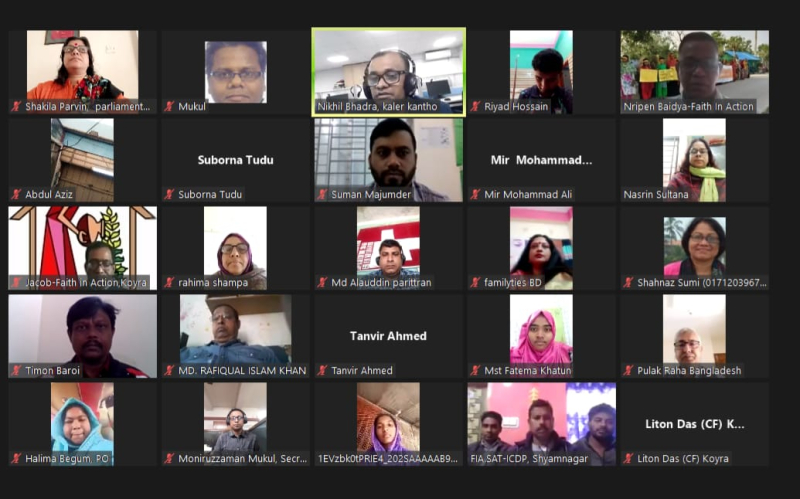- BNP senses ‘dangerous conspiracy’ against democratic transition |
- CEC Vows Credible Election to End Stigma |
- High-level meeting reviews country’s economic progress |
- Dhaka suspends visa, consular services at its Delhi, Agartala Missions |
- Govt to cut savings certificate profit rates from January |
Child marriage increasing on coast due to salinity: Speakers

Civil society leaders believe that child marriages are
increasing on the coast due to the adverse effects of climate change and intrusion
of salinity.
Despite taking different steps by the government and non-governmental organizations, child marriages in the coast are not reducing at the desired rate as the coastal people are losing employment due to salinity and environmental degradation, they observed while speaking at a webinar dialogue on 'Coast child becomes victim of early marriage and the way forward.'
The civil society leaders further said, fresh water shortage is also increasing in the coastal area and there is a lack of awareness. As a result, parents are more interested in sending girls to their husbands' homes instead of sending them to school, they added.
Development organization Faith in Action, civic organization Sunderbans and Coastal Protection Movement and Parliament News jointly organised the dialogue on Wednesday to strengthen the social movement to stop child marriage.
Journalist Nikhil Chandra Bhadra, coordinator of the Sundarbans and Coastal Protection Movement, moderated the dialogue. Sher-e-Bangla Agricultural University teacher Professor Mir Mohammad Ali, Project Officer of the Ministry of Women and Child Affairs Halima Khanam, Former president of Dhaka Reporters Unity Rafiqul Islam Azad, Team Associates team leader Pulak Raha, Social Welfare and Development Agency Chairman Jasmine Prema, Director of Nari Pragti Sangha Shahnaz Sumi, Sports and Cultural Secretary of Dhaka Journalist Union Sakila Parveen, SCAN General Secretary Moniruzzaman Mukul, Executive Director of Faith in Action Nirpen Vaidya, among others, took part in the discussion.
The dialogue was informed that the 'Faith in Action' started working in Koira Upazila of Khulna District in 2019 for women's empowerment, child rights and protection, which later changed and is being conducted in 23 villages of 6 unions of Koira Upazila under the name of Muktir Ahban Project. Under the project, awareness activities are being conducted including reduction of child marriage, empowerment of women and reduction of risky child labour.
It is also informed that during the conduct of this programe from January to November this year steps have been taken to stop child marriage of 22 children through self-help women's groups, cluster level organizations, child protection committees and members of child and adolescent clubs in these villages. A total of 67 child marriages took place in that area, of them 64 are girls and 3 are boys.
The speakers blamed the lack of money and building awareness for child marriage and said, family members arrange marriages by hiding children and even taking them to relatives' homes. In this case, there is evidence of the cooperation of local influential people and public representatives, they said.
Apart from this, the speakers said, the lack of proper implementation of the existing laws is also acting as an obstacle in the way of ending child marriage.
The dialogue recommends taking effective steps to combat the risks of climate change, curbing the encroachment of salinity, creating new jobs, ensuring proper implementation of laws and raising awareness.

